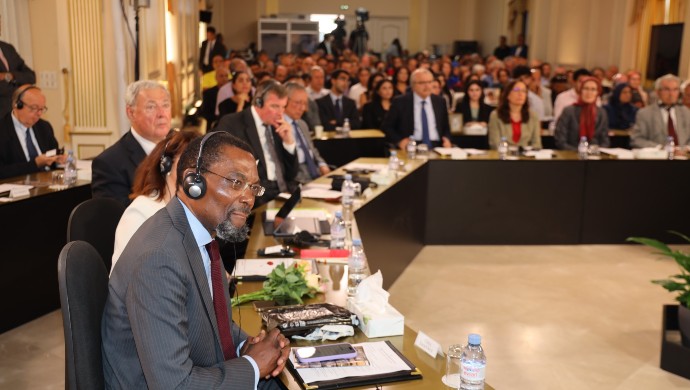
On the occasion of the 35th anniversary of the massacre of 30,000 political prisoners, on Monday, August 21, a conference titled “Four Decades of Crime against Humanity and Impunity from Punishment” was held in Paris.
In this conference, several prominent international judges and lawyers, along with some political figures from different countries, were present. Also at the conference was Mrs. Maryam Rajavi, the president-elect of the National Council of Resistance of Iran (NCRI).
The presence of prominent lawyers and judicial officials from international courts and their speeches show the attention of the international community to 1988 massacre as the biggest organized crime against humanity after World War II.
In this regard, Professor Chile Eboe-Osuji, the former president of the International Criminal Court in The Hague, said, “The story of the 1988 massacre has captured the anxiety of many important voices in the human rights field. Human Rights Watch, an eminent human rights organization, Amnesty International, mandate holders of the United Nations have also worried and expressed concern about the lack of acknowledgment of the 1988 massacre. The massacre itself amounts to the crime of at least enforced disappearance and the crime of enforced disappearance is a continuing crime until there is an acknowledgement of what happened to the victims.”
Professor Leila Nadia Sadat, Special Adviser to the Prosecutor of the International Criminal Court in The Hague on crimes against humanity (2012-2023), said, “I have no doubt that in what I call an atrocity cascade, this is one of the worst instances of crimes against humanity that we have seen. And it may indeed include pockets of genocidal acts because of the ferocity of the crimes and the groups against that which they were directed.”
Professor Vilnas Vadapalas, judge of the General Court of the European Union (2013), highlighted this notion that his country, Lithuania, has introduced persecution and eradication of political groups, such as the distressing case of the PMOI.
Sheila Paylan, an international human rights lawyer and UN legal advisor, said, “The massacres took place based on a fatwa by Khomeini and what has been determined by experts to amount to crimes against humanity and even genocide.”
David Jones, a member of the British Parliament, who was also present at this conference, said, “The unpunished crime that is the 1988 massacre of political prisoners remains an open wound in human history.”
It is worth noting that the crime against humanity and genocide and the punishment of its perpetrators are not subject to the passage of time. And as we saw in the Swedish court and the trial of Hamid Noury, one of the perpetrators of the 1988 massacre, the courts of countries that have signed the relevant conventions have the jurisdiction to deal with these crimes.
In this conference, all speakers emphasized the necessity of ending the impunity of the perpetrators of 1988 massacre, who still hold the highest positions in the regime.
Referring to existing international laws, Prof Eboe-Osuji stated, “Heads of state do not have immunity from the jurisdiction of the ICC (International Criminal Court).”
Professor Vilnas Vadapalas pointed out that according to the principles of international state responsibility, all nations within the international community have the right to demand accountability from Iran.
The “4 Decades of Crimes against Humanity and Impunity” conference is one of the highlights of the litigation movement on its way forward. A movement that started 35 years ago, on August 25, 1988, with Massoud Rajavi’s letter to the then Secretary General of the United Nations (Perez Duquelar). In that letter, the leader of the resistance announced the execution of 860 political prisoners within 3 days and the transfer of their bodies from Evin prison to Behesht Zahra and added that the regime had carried out a wide wave of political arrests in different cities of Iran and had arrested more than 10,000 people.
The leader of the resistance emphasized in this letter that, “Your responsibility as the Secretary General of the United Nations strongly requires that you send a delegation as soon as possible to deal with the mentioned cases and visit the prisons of the Khomeini regime and prevent the accelerated process of killings in Iran.”
In the “Four Decades of Crime against Humanity and Impunity from Punishment” conference, United Nations lawyers and experts emphasized the responsibility of the international community in following up on this heinous crime and expressed their shame over the silence and inaction of the United Nations and world powers.
As Mrs. Maryam Rajavi said in this conference, “On a global scale, the moment has arrived to end the four-decade-long impunity enjoyed by the clerical regime’s leaders, shielding them from prosecution and accountability for their participation in genocide and crimes against humanity.
“Khamenei, Raisi, and Ejeii, along with other architects of the 1988 massacre and instigators of the killing of young protesters during the recent uprisings in Iran, particularly the commanders of the IRGC, must be prosecuted by an international court.
This post was originally published on this site be sure to check out more of their content.






